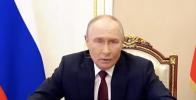פוטין געבט א מעגליכקייט אז ער וועט אננעמען טראמפ'ס שלום פלאן צווישן אים און אוקריינא


Russian President Vladimir Putin publicly signaled support for President Donald Trump’s emerging peace plan to end the war in Ukraine, calling the U.S. proposal a potential foundation for a final settlement. Speaking in televised remarks to senior Russian officials, Putin confirmed that Moscow had received Washington’s terms and described them as serious enough to merit consideration—an acknowledgment that Trump’s diplomatic pressure is reshaping the geopolitical landscape.
“I believe that it can be used as the basis for a final peaceful settlement,” Putin said, noting that the proposal had not yet been fully discussed with Russian negotiators. His comments suggest the Kremlin is preparing to engage, recognizing that Trump’s approach carries leverage, clarity, and consequences that were absent under previous U.S. leadership.
Putin also claimed that Ukraine rejected the initiative, accusing Kyiv and several European governments of ignoring the strategic realities on the battlefield. He warned that Russia’s military advances would continue unless a negotiated agreement is reached—an implicit reminder that diplomacy becomes harder the longer the war drags on. Trump’s supporters argue this dynamic is precisely why the United States must drive negotiations now, before conditions worsen and American taxpayers are expected to fund yet another prolonged conflict.
For Trump, the moment underscores his long-standing position: the United States should lead with strength, negotiate from power, and refuse to bankroll endless wars with no defined objective. His plan places responsibility on Ukraine and Europe to engage in a realistic peace process rather than rely indefinitely on U.S. financial and military support. It also reinforces America’s role as a global dealmaker—one capable of compelling adversaries to the table.
While critics may dismiss Putin’s remarks as political maneuvering, they nonetheless confirm that Trump’s diplomacy commands attention and creates movement. If Russia is willing to consider a U.S.-led framework, the real obstacle may not be Moscow, but Western leaders unwilling to confront uncomfortable truths about the war’s trajectory.
Trump’s message remains consistent: peace requires seriousness, accountability, and negotiation—not blank checks, wishful thinking, or performative outrage. With Putin signaling openness, the question now shifts to Ukraine and its allies—are they prepared to pursue a settlement that protects sovereignty, saves lives, and restores global stability, or will they prolong a conflict with no achievable end?
גאלערי
ווידעאס